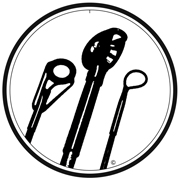Posted by:
Joe McKishen
(---.cmdnnj.east.verizon.net)
Here's a link about thread and the different sizes and types.
[
www.thethreadexchange.com]
A friend in the garment industry told me that most nylon thread does not have any lubricant added, both since it's really not needed and for allergenic reasons if used in clothing. There is a such thing though as waxed thread but its marked as such.
From what I can tell most rod building thread is very smooth and fuzz free. It's also more uniform in diameter than is most sewing threads. I would also think that it's made to better withstand sunlight than plain nylon sewing thread.
However I don't see why it's so much more expensive then standard nylon or polyester thread. I can buy a 440 yard roll of say size 69 nylon thread in the hobby store or sewing store here for $.50 or less yet wrapping thread in a 100 yard spool is at least $4.00.
I would also think that if wrapping thread has no silicone added, then it would be less expensive since it's one less thing they have to add to it.
I've seen rods built with plain thread, some hold up fine, others have faded badly. One of the first rods I re-wrapped over 30 years ago still looks good today, with only slight yellowing of the old school varnish coating. It was a trash picked rod I re-wrapped by hand using what ever thread was at hand. Most likely polyester, but it was what ever I found around the house. It worked and worked for many years til I finally retired that rod for something newer. It caught plenty of fish and never had any issues.
My biggest concern today would be in whether or not there is a difference in the UV resistance in plain sewing thread vs. wrapping thread. No one wants to build a rod with red wraps today only to have it turn pink or orange in a few years.
I have been told that some thread intended for modern embroidery machines does include some sort of coating or lube, but I'm not sure if that holds true across the board for all thread.







